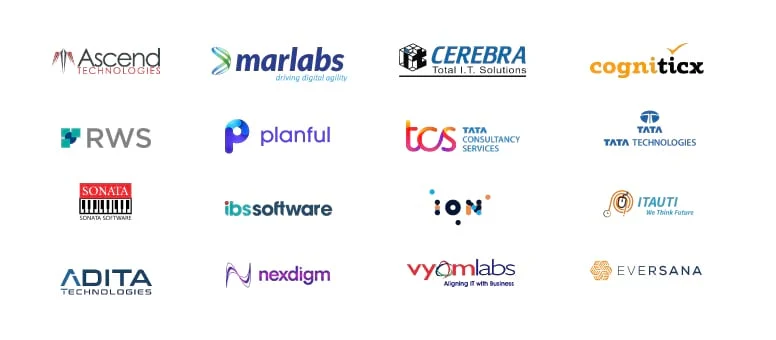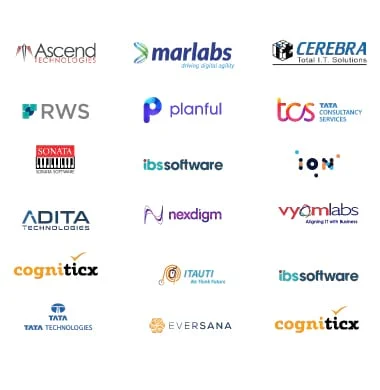30+ Hrs
Hands On Training
Lifetime Access
Updated Content
Customizable
Learning Paths
Industry Expert
Mentors
Projects
Advanced Interactive

Hands On Training
Updated Content
Learning Paths
Mentors
Advanced Interactive
Apache Hadoop is an open source platform that is used to efficiently store and process massive datasets ranging in size from gigabytes to petabytes. Instead of using a single computer to store and process data, Hadoop allows many computer clusters to analyse huge datasets more rapidly in parallel.
HKR delivers the best industry-oriented hadoop training course that is in line to clear the certification exams. Our course covers all the key concepts such as key fundamentals of hadoop, hadoop concepts, building blocks of hadoop, apache hive, flume, streaming, big data hadoop optimizations, etc. During the training period, you can get full support and real-time project assistance from experienced professionals. Enroll today at HKR for accepting the new challenges to make the best out of our hadoop online training.
To apply for the Hadoop Training, you need to either:
The Hadoop course curriculum is structured to streamline the learning process by a team of experts. You can find the complete course details in below-mentioned modules
1.1 Introduction to Big Data and Hadoop
1.2 Introduction to Big Data
1.3 Big Data Analytics
1.4 What is Big Data
1.5 Four Vs Of Big Data
1.6 Case Study Royal Bank of Scotland
1.7 Challenges of Traditional System
1.8 Distributed Systems
1.9 Introduction to Hadoop
1.10 Components of Hadoop Ecosystem
1.11 Commercial Hadoop Distributions
2.1 Introduction to Hadoop Architecture Distributed Storage (HDFS) and YARN
2.2 What Is HDFS
2.3 Need for HDFS
2.4 Regular File System vs HDFS
2.5 Characteristics of HDFS
2.6 HDFS Architecture and Components
2.7 High Availability Cluster Implementations
2.8 HDFS Component File System Namespace
2.9 Data Block Split
2.10 Data Replication Topology
2.11 HDFS Command Line
2.12 YARN Introduction
2.13 YARN Use Case
2.14 YARN and Its Architecture
2.15 Resource Manager
2.16 How Resource Manager Operates
2.17 Application Master
2.18 How YARN Runs an Application
2.19 Tools for YARN Developers
3.1 Introduction to Data Ingestion into Big Data Systems and ETL
3.2 Overview of Data Ingestion
3.3 Apache Sqoop
3.4 Sqoop and Its Uses
3.5 Sqoop Processing
3.6 Sqoop Import Process
3.7 Sqoop Connectors
3.8 Apache Flume
3.9 Flume Model
3.10 Scalability in Flume
3.11 Components in Flume’s Architecture
3.12 Configuring Flume Components
3.13 Apache Kafka
3.14 Aggregating User Activity Using Kafka
3.15 Kafka Data Model
3.16 Partitions
3.17 Apache Kafka Architecture
3.18 Producer Side API Example
3.19 Consumer Side API
3.20 Consumer Side API Example
3.21 Kafka Connect
4.1 Introduction to Distributed Processing MapReduce Framework and Pig
4.2 Distributed Processing in MapReduce
4.3 Word Count Example
4.4 Map Execution Phases
4.5 Map Execution Distributed Two Node Environment
4.6 MapReduce Jobs
4.7 Hadoop MapReduce Job Work Interaction
4.8 Setting Up the Environment for MapReduce Development
4.9 Set of Classes
4.10 Creating a New Project
4.11 Advanced MapReduce
4.12 Data Types in Hadoop
4.13 OutputFormats in MapReduce
4.14 Using Distributed Cache
4.15 Joins in MapReduce
4.16 Replicated Join
4.17 Introduction to Pig
4.18 Components of Pig
4.19 Pig Data Model
4.20 Pig Interactive Modes
4.21 Pig Operations
4.22 Various Relations Performed by Developers
5.1 Introduction to Apache Hive
5.2 Hive SQL over Hadoop MapReduce
5.3 Hive Architecture
5.4 Interfaces to Run Hive Queries
5.5 Running Beeline from Command Line
5.6 Hive Metastore
5.7 Hive DDL and DML
5.8 Creating New Table
5.9 Data Types
5.10 Validation of Data
5.11 File Format Types
5.12 Data Serialization
5.13 Hive Table and Avro Schema
5.14 Hive Optimization Partitioning Bucketing and Sampling
5.15 Non-Partitioned Table
5.16 Data Insertion
5.17 Dynamic Partitioning in Hive
5.18 Bucketing
5.19 What Do Buckets Do
5.20 Hive Analytics UDF and UDAF
5.21 Other Functions of Hive
6.1 Introduction to NoSQL Databases HBase
6.2 NoSQL Introduction
6.3 HBase Overview
6.4 HBase Architecture
6.5 Data Model
6.6 Connecting to HBase
7.1 Introduction to the basics of Functional Programming and Scala
7.2 Introduction to Scala
7.3 Functional Programming
7.4 Programming with Scala
7.5 Type Inference Classes Objects and Functions in Scala
7.6 Collections
7.7 Types of Collections
7.8 Scala REPL
8.1 Introduction to Apache Spark Next-Generation Big Data Framework
8.2 History of Spark
8.3 Limitations of MapReduce in Hadoop
8.4 Introduction to Apache Spark
8.5 Components of Spark
8.6 Application of In-Memory Processing
8.7 Hadoop Ecosystem vs Spark
8.8 Advantages of Spark
8.9 Spark Architecture
8.10 Spark Cluster in Real World
9.1 Processing RDD
9.2 Introduction to Spark RDD
9.3 RDD in Spark
9.4 Creating Spark RDD
9.5 Pair RDD
9.6 RDD Operations
9.7 Demo: Spark Transformation Detailed Exploration Using Scala Examples
9.8 Demo: Spark Action Detailed Exploration Using Scala
9.9 Caching and Persistence
9.10 Storage Levels
9.11 Lineage and DAG
9.12 Need for DAG
9.13 Debugging in Spark
9.14 Partitioning in Spark
9.15 Scheduling in Spark
9.16 Shuffling in Spark
9.17 Sort Shuffle
9.18 Aggregating Data with Pair RDD
10.1 Introduction to Spark SQL Processing DataFrames
10.2 Spark SQL Introduction
10.3 Spark SQL Architecture
10.4 DataFrames
10.5 Demo: Handling Various Data Formats
10.6 Demo: Implement Various DataFrame Operations
10.7 Demo: UDF and UDAF
10.8 Interoperating with RDDs
10.9 Demo: Process DataFrame Using SQL Query
10.10 RDD vs DataFrame vs Dataset
11.1 Introduction to Spark MLlib Modeling Big Data with Spark
11.2 Role of Data Scientist and Data Analyst in Big Data
11.3 Analytics in Spark
11.4 Machine Learning
11.5 Supervised Learning
11.6 Demo: Classification of Linear SVM
11.7 Demo: Linear Regression with Real-World Case Studies
11.8 Unsupervised Learning
11.9 Demo: Unsupervised Clustering K-Means
11.10 Reinforcement Learning
11.11 Semi-Supervised Learning
11.12 Overview of MLlib
11.13 MLlib Pipelines
12.1 Introduction to Stream Processing Frameworks and Spark Streaming
12.2 Overview of Streaming
12.3 Real-Time Processing of Big Data
12.4 Data Processing Architectures
12.5 Spark Streaming
12.6 Introduction to DStreams
12.7 Transformations on DStreams
12.8 Design Patterns for Using ForeachRDD
12.9 State Operations
12.10 Windowing Operations
12.11 Join Operations stream-dataset Join
12.12 Streaming Sources
12.13 Structured Spark Streaming
12.14 Use Case Banking Transactions
12.15 Structured Streaming Architecture Model and Its Components
12.16 Output Sinks
12.17 Structured Streaming APIs
12.18 Constructing Columns in Structured Streaming
12.19 Windowed Operations on Event-Time
12.20 Use Cases
13.1 Introduction to Spark GraphX
13.2 Introduction to Graph
13.3 Graphx in Spark
13.4 Graph Operators
13.5 Join Operators
13.6 Graph Parallel System
13.7 Algorithms in Spark
13.8 Pregel API
13.9 Use Case of GraphX
Use Hadoop features to predict patterns and share actionable insights for a car insurance company.
Use Hive features for data engineering and analysis of New York stock exchange data.
Perform sentiment analysis on employee review data gathered from Google, Netflix, and Facebook.
Perform product and customer segmentation to increase the sales of Amazon.


The Hadoop training course benefits for the following list of professionals.
Aspirants should have a basic understanding of Core Java and SQL.
To start with the Hadoop training course, you need to check with the best institute that delivers knowledge. Before proceeding to join any training, take suggestions from the experts who had already learned the course. We at HKR, with a team of industry experts, are ready to fulfil your dream career to achieve a job in desired companies.
Once you complete the entire course along with real-time projects and assignments, HKR delivers the course completion certification. This certification helps to get a job in any company very quickly.
Our trainers are highly qualified and certified with many years of industry experience with a technical background in Hadoop.
Certification differentiates you from the non-certified peers, and you can demand the best salary in the leading companies.
We, at HKR, provide complete guidance to reach your dream job. But your job will be based on your performance in the interview panel and the recruiter requirements.
Each and every class is recorded so if you missed any class you can review the recordings and clarify any doubts with the trainer in next class.
Yes, we don’t assure 100% placement assistance. We are tied up with some corporate companies so when they have a requirement we send your profiles to them.
Yes, we provide demo before starting any training in which you can clear all your doubts before starting training.
Our trainers are real-time experts who are presently working on a particular platform on which they are providing training.
You can call our customer care 24/7
Max of the students gets satisfied with our training if you are not then we provide specialised training in return.
For Assistance Contact:
![]()
![]() +91 9711699759
+91 9711699759
Query